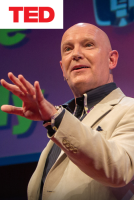
How to Speak So That People Want to Listen by Julian Treasure

Read the summary below and get the key insights in just 10 minutes!

From declarations of love to proclamations of war, the power of speech is undeniable. Yet poor speakers may find their words fall on deaf ears. If you can relate to that shortcoming, don’t despair. According to acoustic expert Julian Treasure, with practice and guidance, you can improve your addresses. getAbstract recommends Treasure’s brief, effective lecture to all who want to deliver outstanding orations.
[/text_block]

- What “seven sins of speaking” to avoid,
- How to improve your presentation skills and
- How to use the tools in your vocal toolbox.

The human voice holds immense potential to effect change in the world. Yet many people find their voices go unheard in a world of noise. Take charge through manipulation of content and vocal mechanics that make speech powerful and engaging. Avoid the “seven sins of speaking” – “gossip, judging, negativity, complaining, excuses, exaggeration” and “dogmatism” – that alienate others. Rather, speak using the “four powerful cornerstones” to make a positive impact and provoke change:
“The human voice: It’s the instrument we all play. It’s the most powerful sound in the world.”
“Many people have the experience that when they speak, people don’t listen to them.”
- “Honesty” – Always tell the truth.
- “Authenticity” – Be true to yourself.
- “Integrity” – Stay true to your word.
- “Love” – Desire only the best for all people.
“Sodcasting [is] imposing your sound on people around you carelessly and inconsiderately. Not nice.”
“We vote for politicians with lower voices…because we associate depth with power and authority.”
Before speaking in public, prepare your voice with a thorough warm-up routine that limbers up your breath, lips, tongue and mouth. Orators who command attention use all the utensils in their vocal toolbox:
“There’s nothing wrong with a bit of silence in a talk.”
- “Register” – The vocal range extends from a high nasal voice to a low chest voice. People associate deeper voices with power and influence.
- “Timbre” – With training, you can adjust timbre, or texture, of your voice. People prefer to listen to “rich, smooth, warm” voices.
- “Prosody” – Injecting a “sing-song” quality into your speech holds listeners’ attention. They tune out when speakers orate in a monotone voice.
- “Pace” – Slowing down the tempo of your words can add emphasis.
- “Pitch” – Changing your pitch can convey diverse sentiments.
- “Volume” – Speaking softly can entice your audience to listen, while speaking loudly can indicate excitement.
Today, people speak poorly to audiences who aren’t listening in venues that aren’t purpose built for sound. Consider a world where people “were creating sound consciously and consuming sound consciously and designing all our environments consciously for sound.” In these surroundings, hearing, listening and understanding would be commonplace.
[/text_block]

Sound consultant Julian Treasure is chairman of the Sound Agency, which advises businesses and individuals on the importance of environmental acoustics.
[/text_block]

Get key insights from 15,000+ non-fiction books at GetAbstract.com.
[/text_block]




